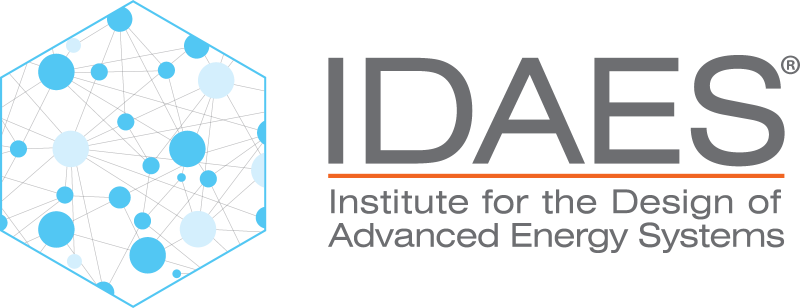# -*- coding: UTF-8 -*-
#################################################################################
# The Institute for the Design of Advanced Energy Systems Integrated Platform
# Framework (IDAES IP) was produced under the DOE Institute for the
# Design of Advanced Energy Systems (IDAES).
#
# Copyright (c) 2018-2023 by the software owners: The Regents of the
# University of California, through Lawrence Berkeley National Laboratory,
# National Technology & Engineering Solutions of Sandia, LLC, Carnegie Mellon
# University, West Virginia University Research Corporation, et al.
# All rights reserved. Please see the files COPYRIGHT.md and LICENSE.md
# for full copyright and license information.
#################################################################################
"""
This module contains utility functions for mathematical operators of use in
equation oriented models.
"""
from pyomo.environ import Param, log, sqrt
__author__ = "Andrew Lee"
[docs]def smooth_abs(a, eps=1e-4):
"""General function for creating an expression for a smooth minimum or
maximum.
.. math:: |a| = sqrt(a^2 + eps^2)
Args:
a : term to get absolute value from (Pyomo component, float or int)
eps : smoothing parameter (Param, float or int) (default=1e-4)
Returns:
An expression for the smoothed absolute value operation.
"""
# Check type of eps
if not isinstance(eps, (float, int, Param)):
raise TypeError("smooth_abs eps argument must be a float, int or Pyomo Param")
# Create expression
try:
expr = (a**2 + eps**2) ** 0.5
except TypeError:
raise TypeError(
"Unsupported argument type for smooth_abs. Must be "
"a Pyomo Var, Param or Expression, or a float or int."
)
return expr
[docs]def smooth_minmax(a, b, eps=1e-4, sense="max"):
"""General function for creating an expression for a smooth minimum or
maximum. Uses the smooth_abs operator.
.. math:: minmax(a, b) = 0.5*(a+b +- |a-b|)
Args:
a : first term in mix or max function (Pyomo component, float or int)
b : second term in min or max function (Pyomo component, float or int)
eps : smoothing parameter (Param, float or int) (default=1e-4)
sense : 'mim' or 'max' (default = 'max')
Returns:
An expression for the smoothed minimum or maximum operation.
"""
# Check type of eps
if not isinstance(eps, (float, int, Param)):
raise TypeError(
"Smooth {} eps argument must be a float, int or "
"Pyomo Param".format(sense)
)
# Set sense of expression
if sense == "max":
mm = 1
elif sense == "min":
mm = -1
else:
raise ValueError(
"Unrecognised sense argument to smooth_minmax. Must be 'min' or 'max'."
)
# Create expression
try:
expr = 0.5 * (a + b + mm * smooth_abs(a - b, eps))
except TypeError:
raise TypeError(
"Unsupported argument type for smooth_{}. Must be "
"a Pyomo Var, Param or Expression, or a float or int.".format(sense)
)
return expr
[docs]def smooth_max(a, b, eps=1e-4):
"""Smooth maximum operator, using smooth_abs operator.
.. math:: max(a, b) = 0.5*(a+b + |a-b|)
Args:
a : first term in max function
b : second term in max function
eps : smoothing parameter (Param or float, default = 1e-4)
Returns:
An expression for the smoothed maximum operation.
"""
expr = smooth_minmax(a, b, eps, sense="max")
return expr
[docs]def smooth_min(a, b, eps=1e-4):
"""Smooth minimum operator, using smooth_abs operator.
.. math:: max(a, b) = 0.5*(a+b - |a-b|)
Args:
a : first term in min function
b : second term in min function
eps : smoothing parameter (Param or float, default = 1e-4)
Returns:
An expression for the smoothed minimum operation.
"""
expr = smooth_minmax(a, b, eps, sense="min")
return expr
[docs]def smooth_bound(val, lb, ub, eps=1e-4, eps_lb=None, eps_ub=None):
"""Returns a smooth expression that returns approximately the value of val
between lb and ub, the value of ub if val > ub and the value of lb if
val < lb. The expression returned is
..math:: smooth_min(smooth_max(val, lb, eps_lb), ub, eps_ub)
**Example Usage** This function is useful when calculating the value of a
quantity with physical limitations that may not be otherwise captured. A
good example of this is using a controller to manipulate a valve to maintain,
for example, a set flow rate. Under some process conditions the controller
may indicate the valve should be more than fully opened or closed. In this
example, the smooth_bound expression can be applied to the unbounded
controller output to get a bounded controller output, ensuring the valve
opening stays in the feasible region, while maintaining smoothness.
Args:
val: an expression for a bounded version of this value is returned
lb: lower bound
ub: lower bound
eps: smoothing parameter
eps_lb: (optional) lower bound smoothing parameter if not provided use eps
eps_ub: (optional) upper bound smoothing parameter if not provided use eps
Returns:
expression: smooth bounded version of val.
"""
if eps_lb is None:
eps_lb = eps
if eps_ub is None:
eps_ub = eps
return smooth_min(smooth_max(val, lb, eps_lb), ub, eps_ub)
[docs]def safe_sqrt(a, eps=1e-4):
"""Returns the square root of max(a, 0) using the smooth_max expression.
This can be used to avoid transient evaluation errors when changing a model
from one state to another. This can be used when a at the solution is not
expected to be near 0.
Args:
a: Pyomo expression
eps: epsilon parameter for smooth max
Returns:
approximately sqrt(max(a, 0))
"""
return sqrt(smooth_max(a, 0, eps))
[docs]def safe_log(a, eps=1e-4):
"""Returns the log of max(a, eps) using the smooth_max expression.
This can be used to avoid transient evaluation errors when changing a model
from one state to another. This can be used when at the solution, a >> eps.
Args:
a: Pyomo expression
eps: epsilon parameter for smooth max
Returns:
approximately log(max(a, eps))
"""
return log(smooth_max(a, eps, eps=eps))
